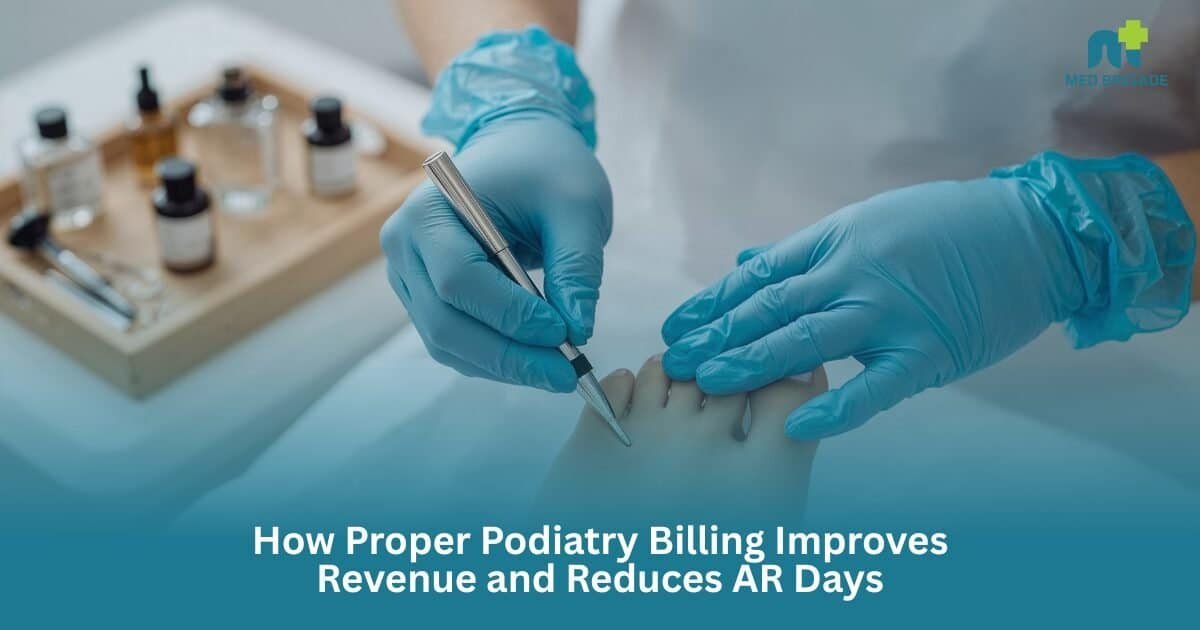
Why DME Providers Struggle with Efficient Billing (and How to Fix It)
There are some unique problems that come with running a durable medical equipment (DME) business, but billing problems might be the most annoying. Many DME providers are buried in paperwork, have to deal with claim denials, and see their cash flow drop because of problems with billing.
The truth is that DME medical billing needs a level of expertise and attention to detail that many providers don’t have the time or money to do well. Knowing about these problems and how to fix them can make the difference between a successful practice and one that has a hard time staying in business.
Sign up for our blogs
Latest Post


A Complete Guide to Medicare & Podiatry Reimbursement

How to Avoid Chiropractic Billing Errors That Cost You Money

Internal Medicine Coding Accuracy: Key to Maximum Reimbursement

How Proper Podiatry Billing Improves Revenue and Reduces AR Days

How Radiology Practices Can Improve Revenue Cycle Efficiency
Billing Enquiries

The Cause of Problems with DME Billing
Billing for DME is very different from billing for regular medical services. The complexity comes from a number of things that make it hard for administrators to do their jobs.
Billing for durable medical equipment requires a lot of paperwork, not just a prescription. Providers need to get physician orders, certificates of medical necessity (CMNs), proof of delivery, and detailed patient records. Every piece of equipment needs certain paperwork, and if you don’t have all of it, your claim could be denied.
Changes in the rules happen a lot.
Medicare and insurance companies change their coverage rules for DME items regularly. Last month, something might have been covered, but it might not be today. Providers who don’t keep up with these changes will have more claims denied and compliance problems.
Before delivery, many DME items need to be approved. This process can take weeks, and figuring out how to get authorization from different insurance companies can slow down patient care and revenue collection by a lot.
Common Problems with DME Billing
A lot of denials
DME providers often have denial rates of 15% to 20% or more, while other healthcare services only have denial rates of 5% to 10%. Most of the time, these denials are because of mistakes in the paperwork, coding, or not meeting certain coverage requirements.
Problems with cash flow
Longer reimbursement times cause problems with cash flow. DME providers have to buy stock up front and wait weeks or months to get paid. This financial strain gets worse when claims are denied or take a long time to process.
Administrative Load
You need trained staff who are dedicated to managing DME billing in-house. A lot of smaller providers have a hard time justifying the cost of hiring billing experts or buying the right technology and training.
Work with specialized DME billing services
Your revenue cycle management can change a lot when you work with professional DME billing services. These experts know all the ins and outs of billing for durable medical equipment and keep up with changes in the law. They can lower the number of denials, speed up payments, and give your staff more time to care for patients.
Make checklists for each type of equipment you offer that are the same for everyone. Make sure your team knows exactly what paperwork they need and check that it is all there before submitting claims. Think about using electronic health record (EHR) systems that are made just for DME providers.
Keep up with the rules for coverage.
Sign up for policy updates from Medicare and the biggest insurance companies. To keep your team up to date on changes that could affect how you bill, have them attend webinars and training sessions. The best way to protect yourself from denials is to know what to do.
Put money into technology. Modern billing software made for DME providers can automate a lot of routine tasks, let you know about possible problems before you submit claims, and keep track of the status of claims that are still open. There is an upfront cost, but the efficiency gains usually make the investment worth it.
DME billing uses HCPCS codes, which are not the same as regular medical procedure codes. Make sure that your billing staff knows how to code DME correctly and stays up to date on changes to the codes.
What to Do About Your DME Billing Problems
Getting paid for DME billing is only part of the picture. You also need to make sure your business model is sustainable so you can serve more patients and still make a good profit. The most important thing is to understand that DME billing solutions need special knowledge and full-time attention.
The most important thing is to do something, whether you improve your own skills or work with professional DME billing services. Every day you put off fixing billing problems is another day of lost money and more stress.
To begin, look at your current denial rates and figure out the most common reasons why claims are denied. This information will help you figure out which areas need the most immediate attention and how well any changes you make are working.
FAQS
DME providers often struggle with billing due to complex coding requirements, frequent insurance policy changes, incomplete documentation, and time-consuming authorization processes. These factors can lead to claim denials and delayed payments.
They can improve efficiency by using specialized DME billing software, ensuring accurate documentation, outsourcing to experienced billing professionals, and regularly training staff on the latest payer requirements.
Common mistakes include incorrect HCPCS codes, missing modifiers, incomplete patient information, lack of prior authorization, and failure to verify insurance eligibility before claim submission.
Yes, outsourcing DME billing to a professional billing company can significantly reduce errors, speed up reimbursements, ensure compliance with payer rules, and allow providers to focus more on patient care instead of paperwork.